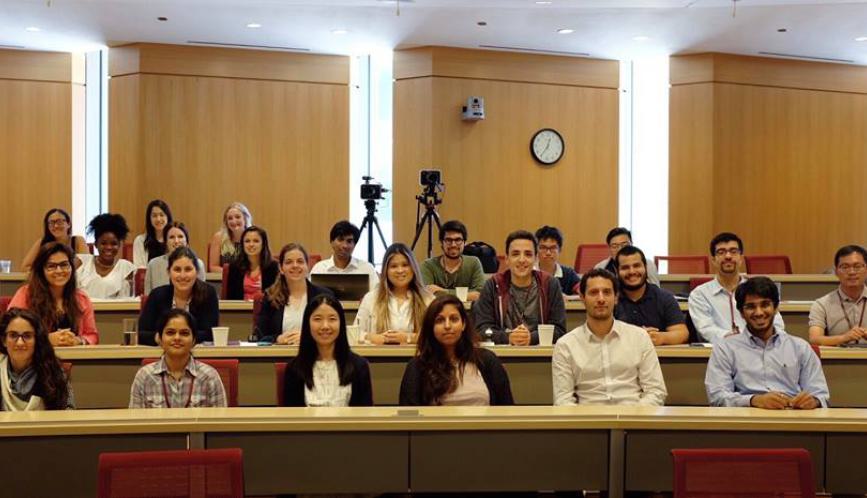Since 2012, the Human Capital and Economic Opportunity Global Working Group has invested in the next generation of scholars through our annual Summer School on Socioeconomic Inequality. Held at colleges and universities around the globe, our SSSI programs have brought together a diverse group of Ph.D. students to learn how to integrate psychological and sociological insights into the foundations of human behavior and conventional economic models in order to examine inequality and human flourishing. Building upon this model, in 2018 HCEO held its’ first summer school geared towards practitioners and master’s students. Held July 30 through August 3 at The University of Chicago, our Masters-Level Summer School on Socioeconomic Inequality gave participants a state-of-the-art overview on the study of inequality through lectures from leading faculty representing a broad array of disciplines.
SSSI Chicago 2018 began with a lecture from the program’s organizer, HCEO Co-Director Steven Durlauf, on intergenerational mobility. The lecture focused on three broad topics: measurement, theory, and normative implications. Professor Durlauf noted that intergenerational mobility is closely linked to equality of opportunity. He said that one objective of public policy is to reduce the dependence of individual outcomes on factors for which an individual is not responsible.
This session was followed by a lecture from ECI network member Kimberly Noble, a neuroscientist, and board-certified pediatrician who is also an Associate Professor of Neuroscience and Education at Teachers College, Columbia University. Noble gave a brief overview of neuroscience and then discussed her research on socioeconomic status and the brain. She walked participants through a recently-launched randomized control trial that she is working on with an interdisciplinary team of researchers. The project is the first clinical trial of poverty reduction in early childhood. It provides unconditional cash transfers to low-income mothers after giving birth for a period of 40 months. Researchers will be tracking the families and measuring the children’s cognitive, emotional and brain development.
On the second day, MIP network member Harold Pollack presented. Pollack is the Helen Ross Professor at The University of Chicago School of Social Service Administration and a Co-Director of The University of Chicago Crime Lab. Pollack’s presentation was on crime and inequality. He discussed his recent work on violence prevention among Chicago youth as well as services available to severely vulnerable populations who come into contact with first-responders and the criminal justice system. Professor Pollack stressed that the mission behind his work is to provide people with realistic, evidence-based optimism and that he is interested in finding scalable, cost-effective economic interventions for a broad range of the population.
ECI network member Dana Suskind presented a public health approach to early learning on Day 3 of SSSI. Dr. Suskind is Professor of Surgery and Pediatrics at the University of Chicago Director of the Pediatric Cochlear Implant Program, and Founder and Director of the Thirty Million Words® Initiative, which aims to ameliorate early language disparities in typically-developing children in disadvantaged families. Suskind told students about how her background as a cochlear implant surgeon led to her interest in early childhood development.
MIP network leader Richard V. Reeves began Day 4 with a discussion on what he calls dream hoarders, or the top 10 percent of Americans who hoard economic and professional opportunities, thereby perpetuating opportunity gaps. Reeves, a senior fellow at the Brookings Institution in Economic Studies, focused on two main areas: class separation and immobility, and market meritocracy and opportunity hoarding. Reeves notes that many people in the upper classes do not self-identify as wealthy, making it even more challenging to address intergenerational immobility.
MIP network member Branko Milanovic, who is Visiting Presidential Professor and LIS Senior Scholar at the Stone Center on Socio-Economic Inequality, finished the day with a lecture on global inequality. Professor Milanovic discussed the economic and political effects of globalization, including the concept of successive “Kuznets waves” of inequality, largely driven, since the first industrial revolution, by technology and globalization.
SSSI 2018 Chicago concluded with a lecture on tax policy and inequality from MIP network member Damon Jones. Jones is an Assistant Professor at the University of Chicago Harris School of Public Policy. He gave an overview on taxes, with a focus on how to achieve equity in tax policy. Professor Jones discussed corporate tax, payroll tax, and consumption tax, along with some examples of how taxes can be used to change economic behavior.
Twenty seven student participants traveled from 19 institutions around the world to attend the summer school. They continued their conversations at SSSI outside of the classroom through meetings with faculty, a welcome dinner, and through HCEO’s social media channels. At the week’s conclusion, one participant remarked that it was a “wonderful program” and several shared the sentiment that their new knowledge would be very helpful in their academic and professional endeavors. “The lectures on intergenerational mobility show many new interdisciplinary approaches and ideas yet to be explored in the field,” one participant wrote. “This impacted my approach to the subject by inspiring ideas to explore in my own research.”
Click here for the full program agenda.



